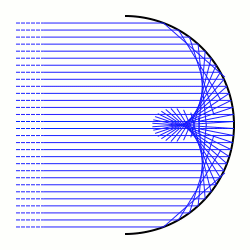Caustic (mathematics)

In differential geometry, a caustic is the envelope of rays either reflected or refracted by a manifold. It is related to the concept of caustics in geometric optics. The ray's source may be a point (called the radiant) or parallel rays from a point at infinity, in which case a direction vector of the rays must be specified.
More generally, especially as applied to symplectic geometry and singularity theory, a caustic is the critical value set of a Lagrangian mapping (π ○ i) : L ↪ M ↠ B; where i : L ↪ M is a Lagrangian immersion of a Lagrangian submanifold L into a symplectic manifold M, and π : M ↠ B is a Lagrangian fibration of the symplectic manifold M. The caustic is a subset of the Lagrangian fibration's base space B.[1]
Explanation
[edit]
Concentration of light, especially sunlight, can burn. The word caustic, in fact, comes from the Greek καυστός, burnt, via the Latin causticus, burning.
A common situation where caustics are visible is when light shines on a drinking glass. The glass casts a shadow, but also produces a curved region of bright light. In ideal circumstances (including perfectly parallel rays, as if from a point source at infinity), a nephroid-shaped patch of light can be produced.[2][3] Rippling caustics are commonly formed when light shines through waves on a body of water.
Another familiar caustic is the rainbow.[4][5] Scattering of light by raindrops causes different wavelengths of light to be refracted into arcs of differing radius, producing the bow.
Catacaustic
[edit]A catacaustic is the reflective case.
With a radiant, it is the evolute of the orthotomic of the radiant.
The planar, parallel-source-rays case: suppose the direction vector is and the mirror curve is parametrised as . The normal vector at a point is ; the reflection of the direction vector is (normal needs special normalization)
Having components of found reflected vector treat it as a tangent
Using the simplest envelope form
which may be unaesthetic, but gives a linear system in and so it is elementary to obtain a parametrisation of the catacaustic. Cramer's rule would serve.
Example
[edit]Let the direction vector be (0,1) and the mirror be Then
and has solution ; i.e., light entering a parabolic mirror parallel to its axis is reflected through the focus.
See also
[edit]References
[edit]- ^ Arnold, V. I.; Varchenko, A. N.; Gusein-Zade, S. M. (1985). The Classification of Critical Points, Caustics and Wave Fronts: Singularities of Differentiable Maps, Vol 1. Birkhäuser. ISBN 0-8176-3187-9.
- ^ Circle Catacaustic. Wolfram MathWorld. Retrieved 2009-07-17.
- ^ Levi, Mark (2018-04-02). "Focusing on Nephroids". SIAM News. Retrieved 2018-06-01.
- ^ Rainbow caustics
- ^ Caustic fringes





















